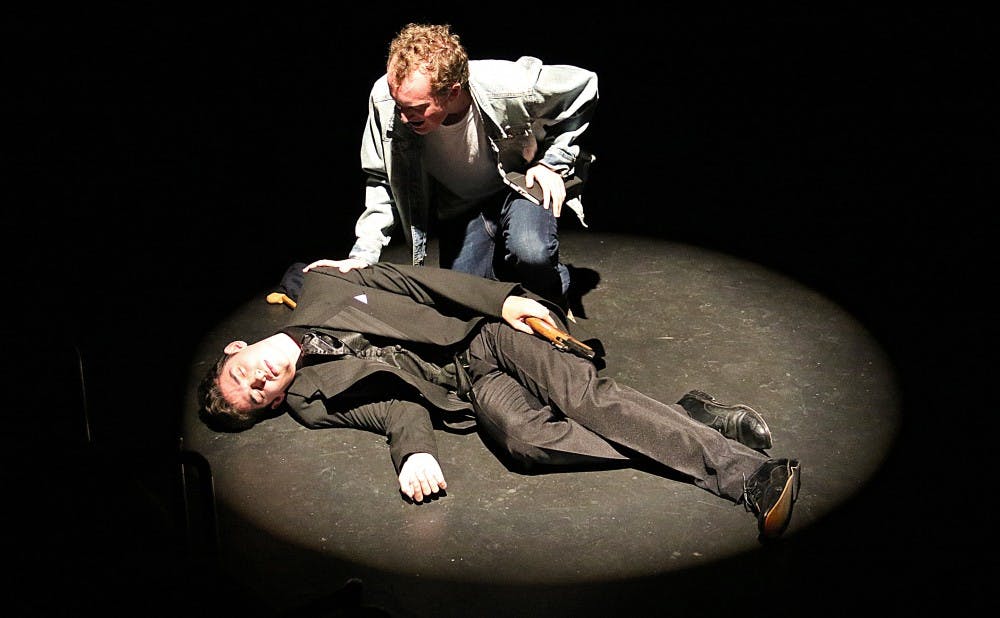Hoof 'n' Horn is shining a light this Fall on some of the most detested figures in American history.
A musical from composer and lyricist Stephen Sondheim, Hoof 'n' Horn's Fall production “Assassins” follows the lives of people who tried—and sometimes succeeded—to kill American presidents. From John Wilkes Booth to John Hinckley Jr., the musical exposes the stories behind the killers and the reasons they chose the paths they did, with the music matching each particular era. The show premieres Oct. 15 at 8 p.m.
Rather than glamorizing or demonizing the killers, “Assassins” gives the audience a personal view of why they tried to kill the most powerful man in America. The musical brings the audience closer to the characters' emotions and exposes their humanity more than mere facts can.
“From the outset, it’s a very controversial-sounding show,” said director Wesley Caretto, a sophomore. “But when you watch it, you notice they’re not being praised or criticized.”
Although the show is dark, it explores the assassins' hidden motives with humor. From macabre jokes to a joyful song about a hanging, “Assassins” provides a new look on history that is both dismal and entertaining.
“People are going to have a much different perspective on the assassins. Many are labeled as mentally ill, but here they’re given a voice,” said music director Max Duncan, a junior.
In experiencing a more personal view of the assassins than the stuff of history books, the audience is given a more comprehensive look into their stories. The assassins aren’t portrayed as villains, but rather as misguided people with their own problems. They all portray how the American Dream can go wrong, and how troubling such a disillusionment can be.
“As Duke students, we’re spoon-fed the American Dream. This show shows that it doesn’t always go from A to B to C,” Duncan said.
By focusing on different eras of American history, “Assassins” depicts how views of the American Dream have changed over time, as well as how it is a fable that often ends poorly. Each assassin finds this out in their own ways, and responds with their own varieties of insanity.
“It’s cool being able to look up characters in the play and find information," said lead actor and freshman David Pfeiffer. "There’s something powerful in playing a person who was actually alive."
Based off of real people and events, “Assassins” takes already known facts about American history and shows them through another lens. It exposes the humanity behind the history books, and tells a side of the stories that would be hidden otherwise. One example of this is in Samuel Byck's monologue, when the would-be assassin of Richard Nixon goes on a diatribe about his personal issues.
“You see straight into that character’s motives, and why they did what they did," Duncan said. "You also see how a nation copes with devastation, something you can’t tell from the history books."
In addition to providing new insights into the past, “Assassins” also puts violence into a different perspective.
“A message behind the show has to do with people using violence to achieve goals. When we look at a history of mass shootings, with questions of motives and identity, “Assassins” can be informative on those issues,” Caretto said.
With a more impactful story than many of Hoof ‘n’ Horn’s more recent shows, like “Hair” and “Legally Blonde," “Assassins” is an absorbing new view of history students won’t want to miss.
Because of its fun music and thought- provoking plot, “Assassins” is one of the most meaningful musicals out there. It touches on themes not easily discussed, such as violence and loneliness, in a serious yet humorous way that leaves the audience with a new perspective on facts that would otherwise show only one side of the story.
“It has a message you absolutely won’t find elsewhere," Caretto said. "You walk out of the theater with all these ideas floating in your head."
Get The Chronicle straight to your inbox
Sign up for our weekly newsletter. Cancel at any time.

